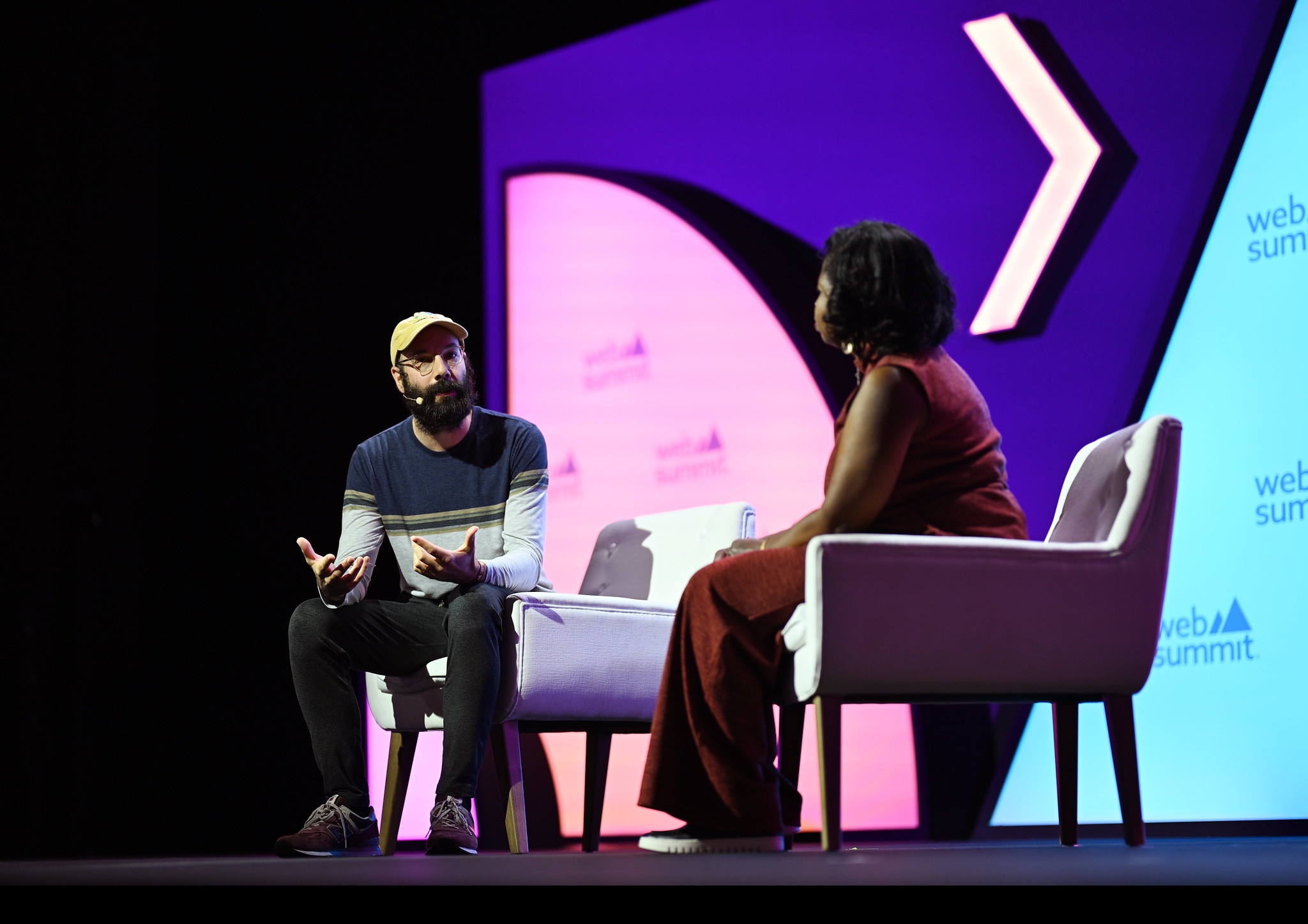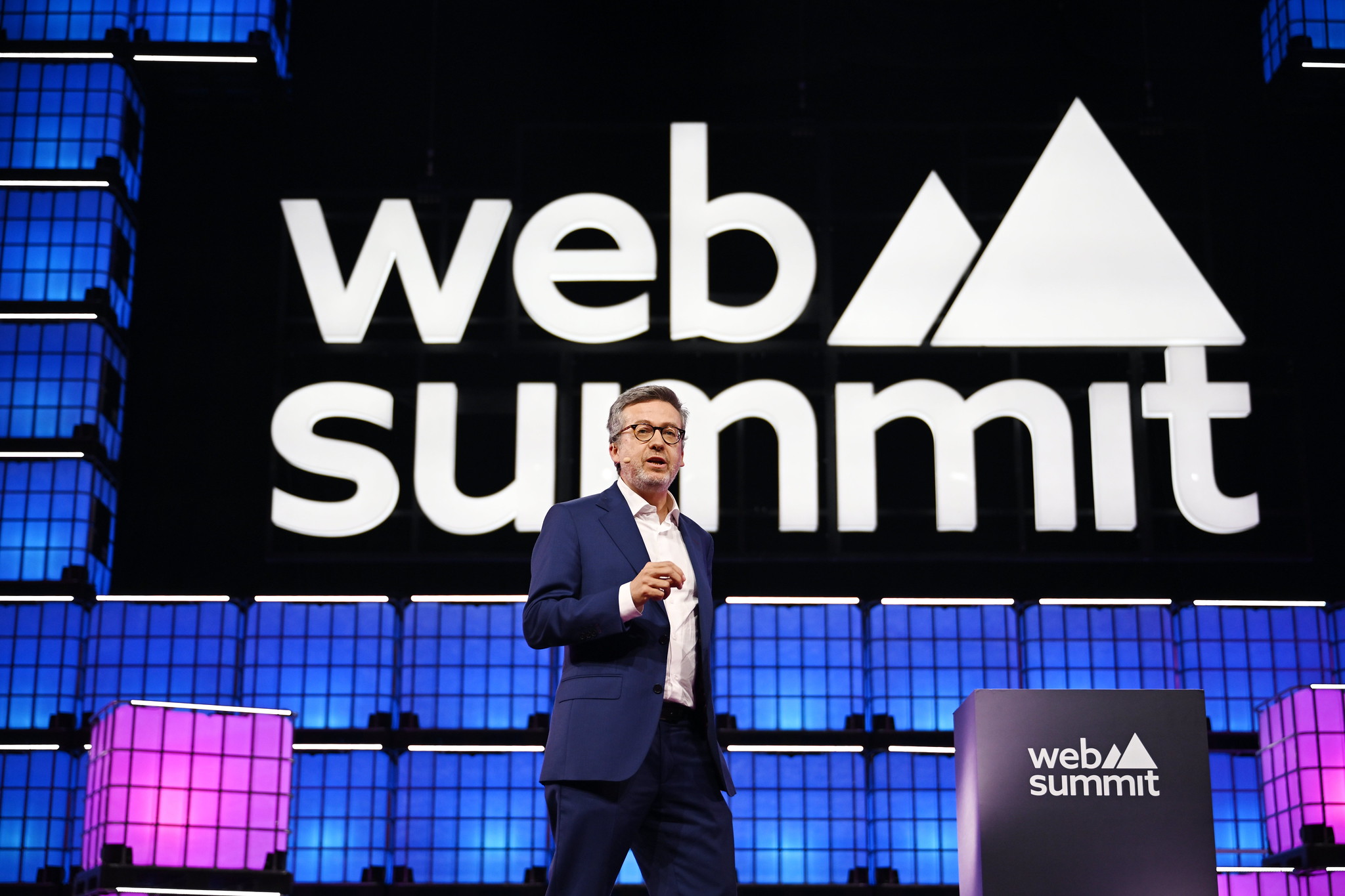
US and China will intervene to halt ‘suicide race’ of AGI – Max Tegmark, President of Future of Life Institute

Max Tegmark, President of the Future of Life Institute, has described the rapid development of Artificial General Intelligence (AGI) as a “suicide race” in which “whoever gets AGI first is going to lose control to this future machine species.”
However speaking at Web Summit’s flagship event at the MEO Arena in Lisbon, Tegmark – whose institute works to steer transformative technologies away from extreme, large-scale risks – said he believed the US and China would ensure safety standards so that their governments would not lose power or control.
Tegmark predicted a mutual programme of safety standards for AGI to be implemented by the governments US and China – and then enforced on the world – to make sure they retained their authority.
“I think what will happen is, once they’ve done that independently of each other – just put in national safety standards, just like they did for medicines and airplanes – then they’ll talk to each other and [say] ‘like hey, wait a minute. How can we make sure North Korea doesn’t build AGI, or some other country?’. Then they’ll push the rest of the world to sign an AGI moratorium treaty where no one does it until the control problem has been solved.”
Tegmark was joined by Hugging Face CSO Thomas Wolf and CEO of The Atlantic Nicholas Thompson who discussed the ethical implications of AI’s breakneck development in a world where technology is gaining a greater foothold in the world of automated industry.
Tegmark’s remarks came after he was asked by moderator Thompson about what America’s most appropriate response should be to the rapid development of AI vis à vis China. Tegmark said: “It’s not an arms race between the US and China. It’s a suicide race where whoever gets AGI first is going to lose control to this future machine species and ruin it for everyone.”
According to the Information Technology and Innovation Foundation, China is accelerating its research into AI to the extent where US dominance in this sector is being directly challenged in the areas of academia, methodology and foreign investment.
However, Tegmark conceded that he believes that China will not propel itself into employing AGI en masse because of the potential loss of control by its government if safety standards are not implemented first.
“This is not a game that the Chinese government has any incentive to play. They like their power. Why would they let some Chinese AI company build AGI and so they would lose control?”
He continued: “Similarly, the US wants to keep its power. I think the US and China both will realise that they just need to make sure that none of their own companies lose control over AGI.”
Thompson then asked Wolf about Hugging Face’s efforts to restrict the use of its AI tools by autocratic countries around the world.
Wolf said: “We are actually rather hard to access from China, because we didn’t spend really the time investing. I think generally we are like a European/US-based company. But it’s also true, China is growing the best open source model. So it’s also hard to ignore that.”
He continued: “The question is how long can we hold this position? If there are political races, for now, we’ve been able to hold this position.”
The trio also touched on the existential discussion pervading AI and its effect on the world, with Wolf decrying the negative outlook on its usage when compared with exaggerated dystopian predictions which, he believes, can only limit us.
“I think in many ways, when we describe the AI world, we have this fake vision of how it’s going to be. We either go in the apocalyptic direction, which is robots are gonna kill us, or we go in this utopian direction where we all love each other and our machines are helping us.
“We need to imagine, actually, how AI is going to integrate in society. And my deep belief is it’s gonna be a lot like the internet. It’s gonna be everywhere.”
Wolf also offered his optimistic prediction surrounding robotics development in 2025: “My prediction for next year is it’s going to be the year of robotics and open-source robotics. This is starting to work in the past few months. As every development in AI, we see it’s, again, exponential.
He added: “There’s a little bit of price [of robots], but this is also decreasing, and because we can use neural network to compensate for some limitations of hardware, I think it’s gonna go to a really low price.”
Tegmark provided another more upbeat projection at the end of the discussion, declaring: “If we can use ever more powerful AI tools that do what we want, to amplify human intelligence, there’s basically no limit to how amazing a future we can build together. So let’s stay away from geopolitical pissing contests nobody wins, and build a great future together.”
Notable speakers throughout this week’s event include:
- Brad Smith, President of Microsoft
- Lidiane Jones, CEO of Bumble
- Timothy Young, CEO of Jasper
- Patrick Kluivert, former Barcelona and Netherlands striker
- Yulia Navalnya, Chair of the Advisory Board of the Anti-CorruptionFoundation, Russia
- Mitchell Baker, Co-Founder and Executive Chair of Mozilla
- Jack Conte, Co-Founder and CEO of Patreon
- Mo Farah, 4x Olympic Gold Medallist
- Oliver Steil, CEO of TeamViewer
- Steven Knight, Screenwriter, Director, PRoducer and Creator of Peaky Blinders
- Thomas Zimmermann, CEO of FREENOW
- Pharrell Williams, singer, producer and entrepreneur
For any questions about this or any other Web Summit content, please contact the Web Summit Newsroom at newsroom@websummit.com.
About Web Summit:
Web Summit runs the world’s largest technology events, connecting people and ideas that change the world. Half a million people have attended Web Summit events – Web Summit in Europe, Web Summit Rio in South America, Collision in North America, Web Summit Qatar in the Middle East and RISE in Asia – since the company’s beginnings as a 150-person conference in Dublin in 2009.
In February, Web Summit held its hugely successful inaugural event in the Middle East. Web Summit Qatar welcomed more than 15,000 attendees and was supported by over 100 partners including the Qatar Investment Authority, Snap, Deloitte, TikTok, Huawei, Microsoft, Shell, Palo Alto Networks, EY, Builder.ai and Qatar Airways. Web Summit Qatar showcased the work of more than 1,000 startups from around the world, and helped introduce them to a network of more than 300 investors in Doha.
Web Summit’s mission is to enable the meaningful connections that change the world. Web Summit also undertakes a range of initiatives to support Diversity, Equality and Inclusion across the tech worlds: this includes IMPACT; Women in Tech; AMPLIFY; the Web Summit/Qatar Foundation Scholarship Programme; and our Community Partnerships.
Useful links
Web Summit website: https://websummit.com/
Web Summit media kit: https://websummit.com/media-kit
Web Summit images: www.flickr.com/websummit
About Web Summit: www.about.websummit.com

